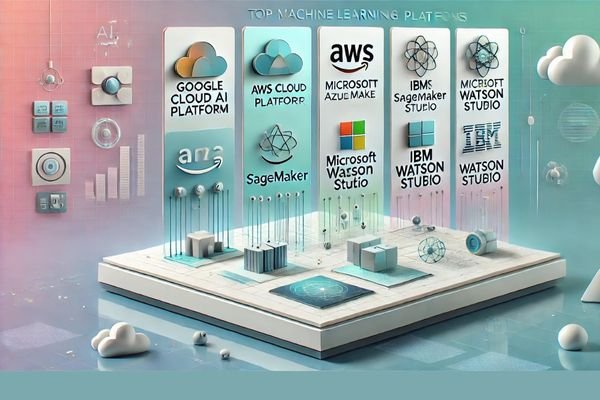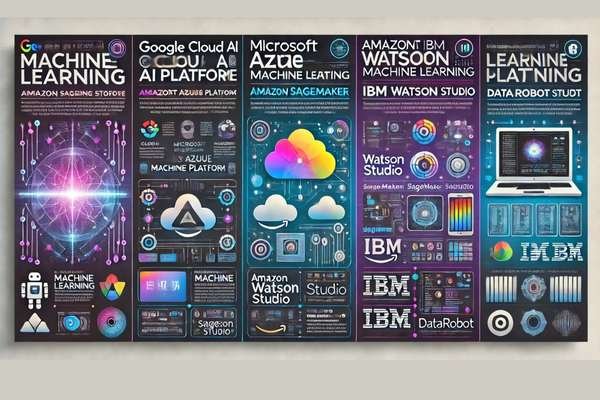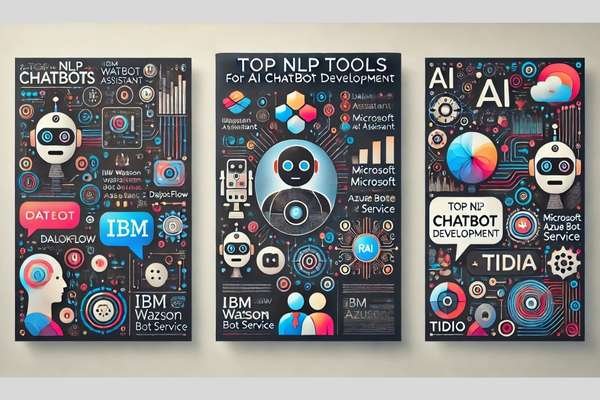
Best Tools for Emotion Detection in AI
November 14, 2024
Top 5 Machine Learning Platforms Compared
November 14, 2024As digital marketing and content creation continue to evolve, machine learning (ML) platforms have become invaluable for professionals seeking to streamline processes and extract insights from vast datasets. Whether you’re a developer, content creator, or marketer, choosing a platform that integrates smoothly with existing systems can significantly boost productivity and results. In this article, we’ll explore the top ML platforms for seamless integrations in 2025, providing insights into features, usability, and customization options for effective decision-making.
Table of Contents
1. Understanding the Need for Machine Learning Integrations
Machine learning platforms offer powerful tools for data-driven decision-making, automating tasks, and personalizing user experiences. Integration capabilities are crucial because they allow these platforms to connect with existing data sources, analytics tools, and content management systems. Here’s why seamless integration should be a top priority:
- Data Flow Continuity: Integrated platforms ensure data flows across systems without manual input, enabling accurate, real-time analysis.
- Enhanced Automation: Smooth integrations allow for automated processes, such as lead scoring, content personalization, and ad targeting, all of which are vital for modern marketing and development.
- Increased Productivity: By reducing the time spent on manual data transfers, you can focus on higher-level tasks, such as strategy and content creation.
2. Top Machine Learning Platforms for Seamless Integrations
Let’s dive into some of the best ML platforms that provide excellent integration capabilities, allowing professionals to leverage machine learning for smarter decision-making and automation.
2.1. Google Cloud AI Platform
Google Cloud AI Platform is designed for businesses looking to harness Google’s powerful infrastructure for machine learning. Known for its robust integration features, it allows users to connect with Google Analytics, BigQuery, and other popular Google services.
- Key Features:
- Comprehensive integration with Google ecosystem tools.
- Supports TensorFlow, PyTorch, and scikit-learn, making it versatile for various ML frameworks.
- Managed Jupyter Notebooks for seamless development and testing.
- Ideal For: Digital marketers who rely on Google’s suite of tools and developers who prefer using open-source ML frameworks.
- Explore Google Cloud AI Platform’s features to understand how it can enhance your workflows.
2.2. AWS SageMaker
Amazon’s SageMaker platform offers a range of services tailored to developers and data scientists. Known for its flexibility and advanced deployment options, SageMaker integrates effortlessly with AWS tools like Amazon Redshift, allowing businesses to utilize existing data infrastructure effectively.
- Key Features:
- Supports multiple ML frameworks, including TensorFlow and MXNet.
- Offers data labeling, training, and deployment in a single, streamlined process.
- Deep integration with AWS ecosystem, enabling advanced cloud capabilities.
- Ideal For: Organizations already using AWS for their infrastructure and developers seeking a high degree of customization.
- Get started with AWS SageMaker for robust machine learning solutions tailored to your needs.
2.3. Microsoft Azure Machine Learning
Microsoft Azure Machine Learning provides an enterprise-grade platform for developing, deploying, and managing ML models. With a strong emphasis on integration, it connects with Microsoft’s ecosystem, including Power BI and Dynamics 365, which can amplify marketing and sales insights.
- Key Features:
- Customizable drag-and-drop interface ideal for non-coders.
- Integration with Microsoft data tools, enhancing analytics and business intelligence.
- Security features aligned with enterprise requirements.
- Ideal For: Businesses invested in Microsoft’s ecosystem and teams needing a balance between customization and ease of use.
- Discover Azure Machine Learning for seamless integration with Microsoft services and top-notch security.
2.4. IBM Watson Studio
IBM Watson Studio has gained popularity for its strong data analytics capabilities and flexibility in model building. It integrates with IBM’s suite of AI services and data tools, making it suitable for large-scale data operations.
- Key Features:
- Supports multiple languages, including Python, R, and Scala.
- Integration with IBM Cloud, enabling secure data storage and access.
- Automated machine learning (AutoML) to help non-experts build ML models.
- Ideal For: Enterprises with complex data needs or those already invested in IBM’s cloud infrastructure.
- Try IBM Watson Studio for advanced analytics and ML solutions.
2.5. DataRobot
DataRobot is a unique platform that focuses on automated machine learning, making it accessible for professionals without extensive technical backgrounds. With integration options that include Salesforce and Tableau, it’s well-suited for businesses looking to simplify ML deployment.
- Key Features:
- AutoML capabilities make model building accessible to non-coders.
- Seamless integration with popular business tools.
- Provides actionable insights and automated reports.
- Ideal For: Marketing teams and business users seeking quick, automated insights without in-depth ML expertise.
- Explore DataRobot’s automated ML and see how it can empower your business decisions.
3. Benefits of Machine Learning Platforms with Strong Integration Capabilities
Choosing a platform with robust integration options provides several advantages for digital marketers, developers, and content creators:
- Real-Time Data Syncing: Real-time integration ensures that all relevant data is immediately available across tools, allowing for instant decision-making.
- Enhanced Customer Personalization: By connecting ML platforms to CRM or email marketing tools, businesses can deliver tailored customer experiences.
- Streamlined Automation: Integrated platforms enable end-to-end automation for various business functions, reducing time spent on manual tasks.
4. Choosing the Right ML Platform for Your Business Needs
When selecting a machine learning platform, consider your team’s technical skill level, existing infrastructure, and long-term goals. Here are some pointers to guide your decision:
- Assess Current Infrastructure: If your company already uses Google, AWS, or Microsoft tools, choosing an ML platform within that ecosystem could simplify deployment and reduce costs.
- Determine Your Technical Expertise: Some platforms, like DataRobot, are optimized for non-coders, while others offer more flexibility for technical users.
- Evaluate Cost and Scalability: Ensure that the platform can scale with your business and fits within your budget.
Top ML Platforms for Seamless Integrations Reacp
| Platform | Key Features | Pros | Cons |
|---|---|---|---|
| Google Cloud AI Platform |
– Comprehensive integration with Google ecosystem tools – Supports TensorFlow, PyTorch, and scikit-learn – Managed Jupyter Notebooks |
– Seamless data flow within Google services – Versatile for various ML frameworks – Facilitates development and testing |
– Best suited for users within the Google ecosystem – May have a learning curve for non-Google users |
| AWS SageMaker |
– Supports multiple ML frameworks – Integrated data labeling, training, and deployment – Deep integration with AWS tools |
– Flexible and customizable – Efficient utilization of existing AWS infrastructure – Streamlined ML workflow |
– Can be complex for beginners – Costs can accumulate with extensive use |
| Microsoft Azure Machine Learning |
– Customizable drag-and-drop interface – Integration with Power BI and Dynamics 365 – Enterprise-grade security features |
– User-friendly for non-coders – Enhances analytics and business intelligence – Secure and compliant |
– May be overkill for small projects – Subscription costs can be high |
| IBM Watson Studio |
– Supports Python, R, and Scala – Integration with IBM Cloud – Automated machine learning (AutoML) |
– Flexible for various programming languages – Secure data storage and access – Accessible to non-experts |
– Limited third-party integrations – Higher cost for advanced features |
| DataRobot |
– AutoML for rapid deployment – Integration with Salesforce and Tableau – Provides actionable insights |
– Minimal coding required – Simplifies ML deployment – Enhances business decision-making |
– Less flexible for advanced users – May not suit highly customized needs |
Frequently Asked Questions
What is a machine learning platform, and why is it important?
A machine learning platform is a suite of tools that enables the development, deployment, and management of ML models. These platforms are essential because they simplify complex data processing tasks, allowing businesses to make data-driven decisions faster and with greater accuracy. Integrated platforms ensure a seamless flow of data, which enhances automation and personalization capabilities.
Which ML platform is best for non-developers?
For non-developers, platforms like DataRobot and Microsoft Azure Machine Learning are user-friendly choices. These platforms offer automated machine learning features, drag-and-drop interfaces, and integrations with common business tools, making them accessible to those without coding experience.
How do machine learning platforms integrate with other tools?
Machine learning platforms integrate with other tools through APIs, connectors, and built-in partnerships. For instance, Google Cloud AI integrates with Google Analytics, while AWS SageMaker integrates with Amazon Redshift. This connectivity allows data to flow smoothly between systems, supporting real-time insights and automation.
Conclusion
In 2025, the right machine learning platform can provide significant advantages for digital marketing professionals, developers, and content creators by simplifying data processes and enabling effective automation. From Google Cloud AI Platform’s robust integrations to DataRobot’s AutoML capabilities, each option offers unique benefits that cater to different business needs and technical expertise levels. Investing in a platform that integrates seamlessly with your current tools will not only enhance productivity but also deliver the insights needed to drive success in today’s fast-paced digital landscape.








